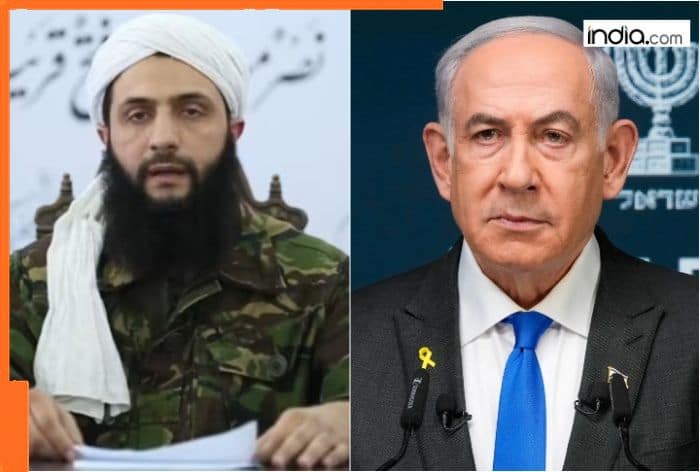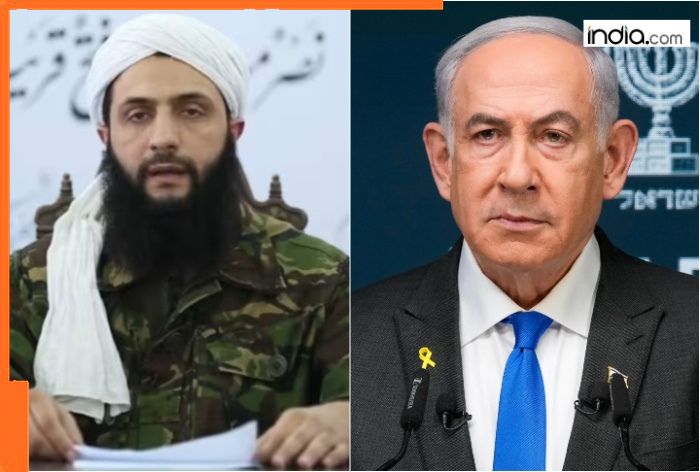Israel has seemingly changed its strategy in Syria following a statement by Abu Mohammad al-Julani, the leader of Hayat Tahrir al-Sham (HTS), Syria’s main rebel group that seized Damascus earlier this month and toppled the Assad regime, ending the Syria civil war.

(File)
Syria civil war: Israel, which launched major onslaught in Syria in the immediate aftermath of the toppling of former Syrian President Bashar al-Assad, has seemingly changed its strategy in the region following a statement by Abu Mohammad al-Julani, the leader of Hayat Tahrir al-Sham (HTS), Syria’s main rebel group that seized Damascus earlier this month and toppled the Assad regime.
What did al-Julani say?
Following the ouster of Bashar al-Assad, HTS chief Ahmed al-Sharaa, better known by his nom de guerre Abu Mohammad al-Julani, issued a statement on the future of Syria’s relationship with Israel, asserting that his group has “no intention to engage in a conflict with Israel”, and the Jewish nation, “no longer has any reason” to continue its attacks or intervene in Syria’s affairs.
‘Israel won’t intervene in Syria’
Meanwhile, days after al-Julani’s statement, Herzi Halevi, the chief Israeli Defence Forces (IDF), said Israel will not intervene in Syria, but asserted that the country’s focus will remain preventing “terrorist elements” from taking root in the Israeli-occupied Golan Heights.
In a video on Saturday, the Israeli military chief, who visited Golan Heights to assess the situation with senior military officials, was seen talking to commanders. Halevi said Israel had occupied the Golan Heights and Mount Hermon for the past week to “protect” its borders, while reiterating the country’s stance that its occupation was “temporary”.
“There was once a hostile country here whose army has been defeated. There is a danger that terrorist elements arrive here, and we are actively working to prevent them from settling in the area,” the IDF chief said. He also asserted that Israel was “not interfering in what is happening in Syria”, and his country “has no intention to control Syria”.
Israel captures Mount Hermon
Halevi comments came after Israel occupied the UN-monitored buffer zone, designated as a demilitarised zone since 1974. Israeli forces have seized a Syrian army checkpoint and deployed troops to the summit of Mount Hermon, the highest point in the region.
Almost immediately after Assad’s fall, the IDF launched major attack is Syria, razing its military infrastructure to the ground, and carried out a ground operation to capture strategic areas, including Mount Hermon, Syria’s tallest peak. The seizure of Mount Hermon is being described by many experts as Israel’s ‘biggest victory’, even though Tel Aviv has asserted its occupation is temporary and the Israeli army will withdrawn from the region once its objectives are fulfilled.
Arab nations condemn Israel’s actions
Israel’s military actions in Syria have been heavily criticised by Arab nations, who have called on the international community to respect Syria’s sovereignty.
While Israel has claimed that its its move into Syria is limited to the buffer zone and not a permanent occupation, several reports in the Israeli media have quoted sources as saying that Israeli forces could be deployed in the buffer zone for a long time. Notably, Israel already occupies the Golan Heights region, a strategic plateau in southwestern Syria adjoining Mount Hermon.
Golan Heights was captured by Israel in the 1967 war, and the Jewish nation has occupied the area ever since, even though the occupation has been deemed illegal under international law, and no major country, except the United States, recognises Israel’s claim to the region.
